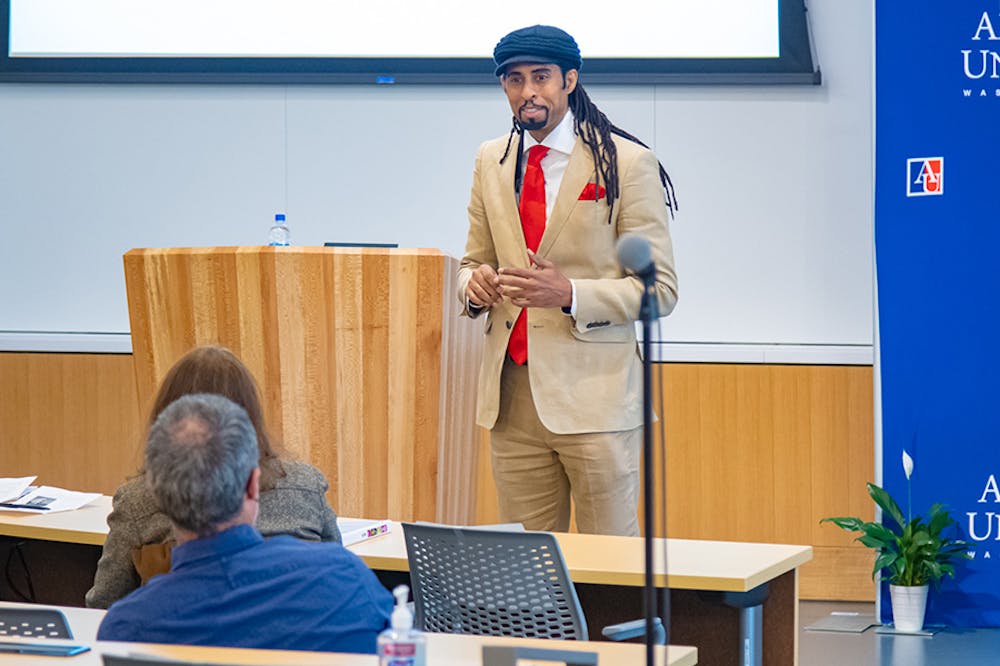As world leaders met in Glasgow for the United Nations COP26 Climate Summit, American University Climate held a simultaneous climate conversation at the “Seeing Climate Change” symposium from Nov. 5-7.
AU hosted over a dozen speakers from various fields to come together and discuss climate-related issues, with each contributing a unique perspective. Inspired by Diane Burko’s climate exhibit at the AU art museum, the goal of the symposium was to discuss how climate change can be made more visible and seen in the midst of such a complex challenge.
“We need more than climate science to tackle climate silence,” said Max Paul Friedman, interim dean of the College of Arts and Sciences. “We need our activists, our authors and our artists to touch the hearts of those whose minds have not yet been moved by all the data.”
The event began Nov. 5 with a panel on climate change-related art featuring Burko, art critic Eleanor Heartney and curator Jennifer McGregor. The speakers discussed the role of artists in climate change and how art can make climate issues more visible.
“The number of artists that have gone to Greenland and the Arctic … and then brought that experience back to us,” McGregor said. “They’re seeing it and experiencing it not just through the graphs and the numbers, but through their lens.”
The conversation expanded with the panel discussion, “Who Sets the Climate Agenda.” Speakers Devi Lockwood, Olúfémi O. Táíwò and Andy Revkin spoke on both the shifts they’ve observed in language on climate change and those that still need to happen. The speakers shared their ideas for opening up the conversation to a broader range of contributors and amplifying the voices of those most directly affected by climate change.
Speakers touched on the importance of storytelling to better convey the real-world effects of climate change, rather than focus solely on the looming threat of global warming. Lockwood emphasized this in the panel:
“The way that we discuss climate change can feel really abstract and inaccessible to a lot of people… Climate storytelling that is frankly just more creative will better serve everyone,” Lockwood said.
The event’s lunchtime keynote speaker was Dr. Mustafa Ali, vice president of environmental justice, climate & community revitalization for the National Wildlife Federation, who discussed the disproportionate impacts of climate change on disadvantaged communities.
Ali emphasized the “power of policy” in transforming this country’s approach to address climate change.
“In this transformational moment, we can make change,” Ali said. “If there is intentionality, if there is equity and if we truly make sure that we’re in this together.”
Following the symposium’s theme of making climate issues visible, Lockwood spoke about her book, “1,001 Voices on Climate Change.” Lockwood traveled to 20 countries across six continents to conduct 1,001 interviews with those affected by the climate crisis.
“Deep listening is something we really urgently need to confront the climate crisis,” Lockwood said. “Listening is the first stop on the way to solution building. If we’re building solutions that don’t take into account the voices of people who will be impacted, it’s dangerous and more importantly ineffective.”
Lockwood continued the conversation about making discussions about climate change accessible to a wider audience.
“I want to do my best to diversify the notion of expertise,” Lockwood said. “People are experts in their own lived experience. Climate science is crucial of course, but by putting that science in dialogue with the people who are impacted, we can begin to move forward in a way that’s more creative, collaborative and interesting.”
The final speaker, artist Jaimes Mayhew, presented some of his recent art works, exemplifying the process through which artists might use their medium as an alternative channel to explore aspects of climate change and the social tensions in our natural spaces. Mayhew touched on the importance of rethinking our approach to the natural world, making art that addresses the heteronormative nature of rural spaces and bringing light to the queerness that is present throughout.
When asked about the joy he finds in the environment, Mayhew turned to mountains.
“I really just love being next to something that’s just enormous, where I can really understand the complexity of the world that we live in on a scale that is kind of confounding,” Mayhew said.
The symposium’s contributors not only shared a variety of expertise, but a push for maintaining hope around the future of the climate crisis despite grim and discouraging data.
“I’m a stubborn optimist and I invite you to be one as well,” said Jennifer Morgan, executive director of Greenpeace International, in a virtual speech she gave before the lunchtime keynote speaker. “As one must be hopeful. In these times of the devastating climate and biodiversity crisis, to hope is to be courageous.”





